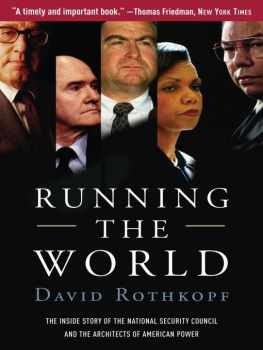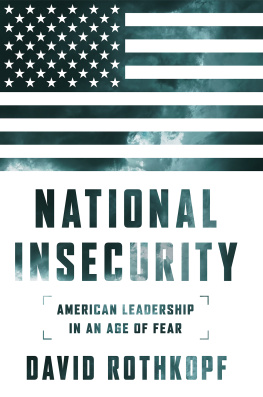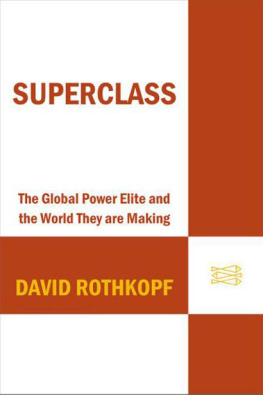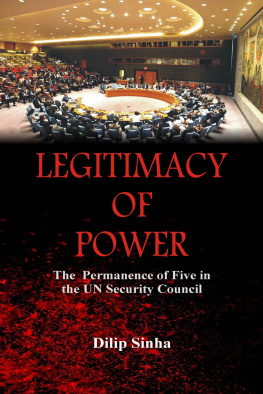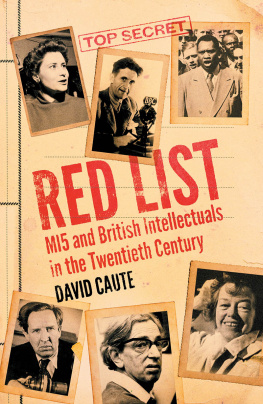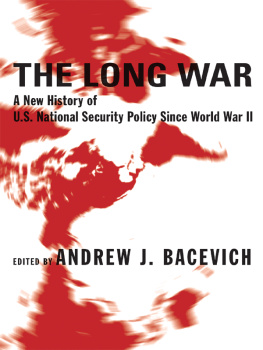Table of Contents
PRAISE FORRUNNING THE WORLD
[Rothkopf s] insider status... serves him well; he seems to know everyone in the foreign policy world and had interviewed most of the former national security advisers, as well as various other heavyweights.
New York Times Book Review
[A]nyone interested in the process of foreign policymaking will want this book on his or her shelf.
Foreign Affairs
[A]n outstanding history of the NSC.... the insights into how this secretive panel operates are authoritative and revealing.
International Affairs
Running the World does a masterful job of telling the story of our modern Presidents and their inner circles, using meticulous research, lively writing and his extraordinary access to the key players to bring critical events in recent world history alive. The book offers penetrating analysis, valuable perspectives on where we are headed and the equally important human side of the story, providing an unprecedented view of the relationships, partnerships and rivalries that have shaped and driven the National Security Council for the past 60 years. It is likely to be seen as the definitive history of the NSC.
Samuel R. Berger, former U.S. National Security Advisor
Running the World is not only an outstanding history of the NSC, it uniquely portrays the personal chemistry among each presidents most senior advisers and between those advisers and the presidents they served.... [T]his is the bestand most readablebook on the history of the NSC I have seen.
Robert M. Gates, former Director of the Central Intelligence
Agency, former Deputy National Security Advisor
An impressively comprehensive, revealing, and insightful examination of the most powerful foreign policy making institution in the U.S. Government and of the key individuals who made it so. Invaluable to scholars, practitioners and concerned citizens.
Zbigniew Brzezinski, former U.S. National Security Advisor
Rothkopf expertly captures how the skills and shortcomings of the NSC Staff have over the years translated into Americas successes and failures, with real consequences for people around the world.
Richard A. Clarke, author, Against All Enemies,
former U.S. Counter-Terrorism Czar and senior official
in the administrations of four U.S. Presidents
At last, a real history of the National Security Council, from its origins after World War II through its transformative Nixon-Kissinger era to its present role at the center of American national security policy-making. As an insider, Rothkopf knows how it works; as a skilled storyteller and historian, he brings it to life, in a book rich with new insights and new information.
Richard Holbrooke, former U.S. Ambassador to the United Nations
For Adrean, Joanna and Laura,
the committee in charge of running my world
Good government obtains when those who are near are made happy and those who are far off are attracted.
Confucius
I must fairly say, I dread our own power and our own ambition; I dread our being too much dreaded... it is ridiculous to say we are not men, and that, as men, we shall never wish to aggrandize ourselves in some way or other... we may say that we shall not abuse this astonishing and hitherto unheard of power. But every other nation will think we shall abuse it. It is impossible but that, sooner or later, this state of things must produce a combination against us which may end in our ruin.
Edmund Burke
Introduction
WE WERE IN a maharajahs garden in Jodhpur. It was a warm January afternoon. Great purple flowers hung over the walls of the garden and filled the air with their fragrance.
My father and I had come a long way across India during the preceding three weeks, laughing and arguing, eating prodigious amounts of delicious but, in one instance, rather toxic food, and hoping against hope that our drivers almost impossible luck would hold. He was a slight young man who was undistinguished by anything other than a single long red fingernail and an astonishing lack of aptitude for his chosen profession. We sped in our small beige Ambassador car at mind-numbing speeds down narrow Indian highways that were marked more often by wrecks and wayward cattle than by signs. Every destination was therefore enthusiastically welcomed with one or more Kingfisher beers, a few silent prayers of thanks, and then the kind of animated discussions that come only with survivors rush, alcohol, or both.
By the time we got to Jodhpur, several of those discussions blended together to form a kind of intellectual leitmotif for this father-son bonding trip. The central issue: whether men could make a difference in shaping the course of history or whether we were all essentially surfers, riding the tides of our times, acting like we were in charge because we were on top but all the while aware that we could be swept under by any of a countless number of forces beyond our control.
There are a number of reasons why this topic came to dominate our trip. One was that I was relatively young, thirty-three, and my father was sixty-three. I was full of hubris and hope that a chance would come around for me to influence history, to make a mark. My father, an exceptionally accomplished scientist and teacher, had been chastened somewhat by experiences that seemed elemental rather than driven by human choice. He had escaped the Nazis in late 1939 and four years later returned to Europe as a lieutenant in the U.S. field artillery. There he combed through the wreckage of a battered continent, looking for signs of the almost three dozen relatives who had died in the concentration camps. Back in the United States, he conducted scientific research on how we learn, and over the years the course of his research was buffeted by the fads and fashions of the times and the changing funding priorities of the military or of Bell Laboratories, where he worked.
Our India trip also took place during a period of considerable change globally. It was January 1989, the beginning of the end of the Cold War. The first stirrings and demonstrations of Czechoslovakias velvet revolution had begun. The Berlin Wall would fall only eleven months later. The Soviet Union was tottering.
Although around us were the trappings of the Raj, we were in an India that was warming to globalization. Two decades earlier, my father had been part of a project to put a television satellite above Gujarat in an effort to bring new channels of education to the impoverished students of that province. By 1989, investment bankers had begun to root around, agitating for reforms that would come over the ensuing decade and help India position itself as a player to be reckoned with in the information age.
Our rambling, trans-India debate was thus in character and in step with the times. And so we jousted, with heat, vindaloo, mysterious ingredients, and East Coast Jewish intellectual dinner battle intensity bringing beads of sweat to our foreheads: Was Gorbachev driving Russian reform or were the exigencies of ruling a faltering empire driving Gorbachev to reform? Were the charming playwright Vaclav Havel or the rough-around-the-edges shipyard worker Lech Walesa people who could actually mobilize a nation or redirect destiny, or were they selected by circumstanceactive, visible, contributingbut far less important than greater forces that were harder to put a face on? What about Napoleon, I would ask, or Newton, or Einstein? Wasnt Napoleon simply a reaction to the French Revolution, just another vainglorious Frenchman seeking to reclaim the crown of Charlemagne? Wasnt Leibniz inventing the calculus at the same time as Newton? Did Einsteins wife write his papers? And wasnt he himself just a symptom of a global cultural movement toward relativism made possible by increased technological capabilities that allowed us to measure things more precisely, see greater distances, see smaller objects, tie theories of the unseen to evidence of what really was?

